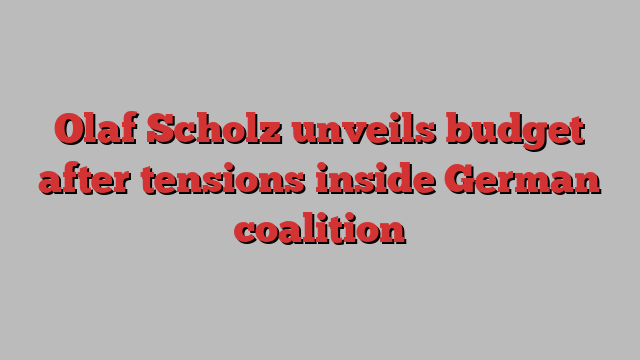
Chancellor Olaf Scholz has unveiled a deal on Germany’s budget for next year and a package of economic reforms designed to stabilise a coalition that had been driven to the brink over arguments on spending.
The package includes measures to boost corporate investment, tax incentives for R&D and steps to encourage people to re-enter the labour market and work longer hours. Ministers expect it will boost next year’s GDP growth by 0.5 percentage points.
But it was unclear whether the new budget would improve the fortunes of a government whose popularity has slumped in the face of near-constant bickering between coalition partners and a flatlining economy.
Scholz told reporters he was convinced the agreement would “strengthen and stabilise our coalition” and demonstrate it was committed to solving the most urgent problems at a time of “great distress for Germany, Europe and the world”.
The wrangling over the budget came against a political backdrop that has alarmed many in Scholz’s coalition, with Marine Le Pen’s Rassemblement National prevailing in the first round of France’s parliamentary elections and Joe Biden’s poor performance in the US presidential debate increasing fears in Germany of a second Trump presidency.
It also comes at a time of gloom about the German economy, which was the worst-performing major economy last year, with GDP shrinking 0.3 per cent and the government expecting growth of just 0.3 per cent in 2024.
Several experts have warned they may downgrade their forecasts for this year after German factory output dropped 2.5 per cent in May from a month earlier, driven by sharp falls in construction, carmaking, equipment and machinery, according to data released on Friday.
The draft budget for 2025, which involves €481bn of spending, down from €489bn this year, will comply with the “debt brake”, Germany’s strict constitutional cap on new borrowing, in a clear victory for Christian Lindner, the hawkish finance minister and leader of the liberal FDP.
He had faced intense pressure from Scholz’s Social Democrats to loosen the debt rules and increase spending after Russia’s invasion of Ukraine.
The cabinet was supposed to approve a draft budget on Wednesday but the deadline was extended as cabinet members balked at the strict spending limits Lindner prescribed for each ministry. Scholz’s cabinet will now nod through the draft plan on July 17 and send it to the Bundestag, which will pass it in November or December.
Lindner, Scholz and the Green deputy chancellor Robert Habeck ended up meeting 23 times in the chancellery, spending a total of 80 hours on the negotiations, which at times strained coalition unity to breaking point.
But they pulled back from the brink. “To lose our nerve, to throw it all away and run away from our responsibilities — I would have no sympathy with that as chancellor,” said Scholz. At a time of growing insecurity, Germany must be an “anchor of stability” in Europe, he added.
In the end the parties agreed both on the budget for next year, an €11bn supplementary budget for this year, as well as the bundle of economic reforms.
But anger over the strict spending cuts imposed by Lindner continues to rankle. The foreign ministry requested a €7.4bn budget for next year but received only about €6bn. It saw its humanitarian aid budget halved from €2.2bn this year to €1bn in 2025.
Boris Pistorius, defence minister, also came away disappointed. He had asked for €6bn in additional money for next year but received just €1.2bn.
“The Bundeswehr [German armed forces] will be drastically under-financed,” said Johann Wadephul, defence spokesman for the opposition Christian Democrats,
Scholz insisted, however, that the government would from now on abide by Nato’s target of spending 2 per cent of GDP on defence every year, and promised the defence budget would rise to €80bn from 2028, from €52bn this year.
The coalition also agreed on measures to increase child benefit, raise investments in daycare facilities and spend more on social housing, which will be funded to the tune of €20bn by 2028.
Business leaders expressed disappointment with the measures. The BDI, Germany’s main business lobby group, said they were not enough to “strengthen growth factors in a sustainable way”, adding it had been hoping for moves to reduce the tax burden on companies.
Wolfgang Grosse Entrup, head of the VCI trade body for the chemicals industry, described them as a “damp squib”.
The government said the budget for next year would include net borrowing of €44bn — a sum allowed under the rules of the debt brake.
“It is not an austerity budget,” Lindner said, highlighting that it contains a record €57bn of public investments. More public money would, he said, be spent on railways, roads, public transport and digital infrastructure.
Additional reporting by Martin Arnold in Frankfurt